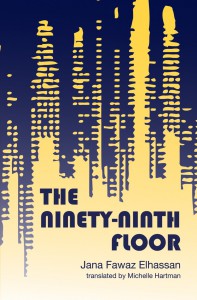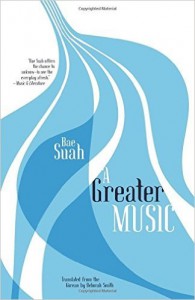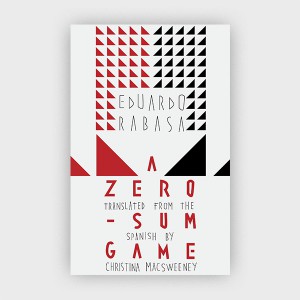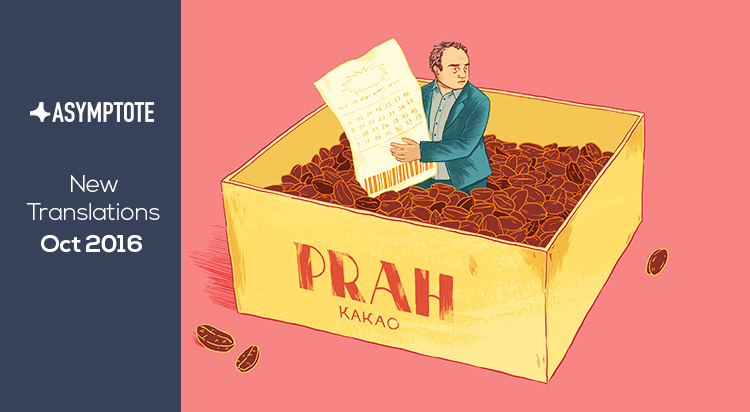
The Ninety-Ninth Floor, by Fawaz Elhassan, tr. Michelle Hartman. Interlink Publishing.
Review: Saba Ahmed, Social Media Manager, UK
Shortlisted last year for the International Prize for Arabic Fiction, The Ninety-Ninth Floor is Jana Fawaz Elhassan’s third book: an ambitious, multi-voiced novel, spanning the topographies of the Sabra and Shatila refugee camps in 1980s Beirut, and New York in the New Millennium. It is also the first of Elhassan’s works to be translated, by Michelle Hartman, from the Arabic into English.
The plot centers around Maj’d, a successful video-game designer whose life among the dizzying skyscrapers of Manhattan, and the subterranean depths of its subway system, bears a haunting resemblance to the cramped, vertical heights of the refugee camps he has fled where “garbage piled up in alleyways”. Palestine, reflects Maj’d, is “a land that inhabits me that I have never stepped foot on”. It occupies his deepest memories, the walls of the camp where the displaced mark the distance from imagined homelands, and is framed—in the present-day narrative—as a map in Maj’d’s apartment in New York. It is an imagined space where Maj’d’s father obstinately believes his dead wife and Maj’d’s mother is waiting for them with their unborn child.
The spatial dimensions of the novel mirror this hyper-reality. The text is littered with a cast of characters who are attempting to navigate life in the wake of war and political trauma. Consequently, the plot is distended by a lack of closure, permeated with repetitive strains of absence and loss. Maj’d’s relationship with Hilda, a dancer who is also trying to build her life anew, away from her Orthodox Christian family in Lebanon, becomes a battle-space for negotiating distances and originary points from which to examine notions of identity, belonging, and worth. Is the love they share true and authentic, or is there a more complex conflation of the female body and nationhood at play here?
There are certainly echoes of recent political fiction from the Middle East in The Ninety-Ninth Floor, such as of the spare, Kafkaesque political allegory The Silence and the Roar by Syrian writer Nihad Sirees. Yet, Elhassan is less interested in form, and more invested in dissecting the emotional vicissitudes of love. There is a certain sagginess to the novel which gestures to the so-called ninety-nine floors or levels of the book. When Hilda returns to Lebanon, to the home she has left behind, she thinks back to the home she has created with Maj’d. “Perhaps,” she considers, “I also came back to occupy this memory, to tell it that we can arrive at some kind of settlement: to expand into all places and be done with our enmity toward our roots”. It is hard not to read these words without a degree of skepticism, to wonder whether this resolution papers over the allegorical implications of difference and attachment. But perhaps it is more fitting to hear these closing lines echo like the one-note sonic beeps of an Atari or PlayStation video game, like the kind designed by Maj’d. In this simulated fantasy, Elhassan suggests, love is creative and imaginative work in a world where our collective national consciousness consigns us to love and live in very specific ways.

A Greater Music, by Bae Suah, tr. Deborah Smith. Open Letter Books.
Review: Theophilus Kwek, Chief Executive Assistant, UK/Singapore
It is perhaps inevitable that Deborah Smith’s new translation of Bae Suah’s novel A Greater Music—forthcoming this October from Open Letter Books—will be compared to her recent prizewinning translations of Han Kang’s The Vegetarian and Human Acts, both of which are suffused with Han’s unique voice and vision. But Bae is a compelling, inventive, and significant author in her own right, and Smith’s ability to match these qualities with a stylish and highly readable translation leaves no doubt about her contribution to the growing canon of Korean literature available in English.
A Greater Music, which records the experiences of a young Korean narrator’s relocation to Berlin through her relationships with Joachim, her boyfriend, and M, her first German language teacher, draws at least in part from its author’s own journey. Bae Suah, a former civil servant with a degree in Chemistry who made her literary debut in 1988, lived in Germany for 11 months in 2001, learning the language there. Though she has since moved back to Seoul, she has also previously translated various works by Sebald and Kafka into Korean.
It is no surprise, then, that A Greater Music, first published in 2003, deals with loss and dislocation through language learning, turns of speech, and acute reflections on what is heard, said, and read. One passage, for example, recalls the initially austere, even frigid M’s attempts to teach the narrator “(not) the meaning of each individual word, but the absolute, universal concepts to which the words referred”; the narrator’s longing for closeness is mirrored in her sense that such concepts “do not recognize national borders, do not make up a sovereign state, and are all equally close to the centre they cluster around”. Another telling note is the narrator’s observation that while she was irritated by photographs that “broke up the monotony of the prose” when reading in Korean, “with German it was helpful to have a break now and again”. These touches, immediately familiar to any second-language student, allow Bae to depict and personalize what is often a lonely, liminal experience.
The novel, however, does not only deal with differences of language and locale. Joachim and M represent distinct faces of Berlin, and condense various aspects of class and culture in German society. The “greater music” of the title refers, at the novel’s outset, to M’s taste for Shostakovich symphonies, along with the “poetry of Lorca, Apollinaire, Rilke, Küchelbecker”—these stand in stark contrast with the narrator’s youthful preference for ABBA. The simple comparison implied in the idea of a “greater music”, though, is undercut by the narrator’s own observation that “music is absolute, just like death”, and that “a comparison cannot be made between … Beethoven’s Concerto no. 2 or no. 3 as if one were ‘lesser’ and the other ‘greater'”. And so, when she visits Joachim’s mother, she does not comment on the latter’s fondness for the popular violinist Andre Rieu in those terms, but only describes Rieu’s facial expression as that of “a gifted actor”. Rather than adopting frames of “high” or “low” culture, her outsider’s perspective is guided by things that seem more or less authentic in her own experience.
Smith transposes these ideas into an English prose style that is chatty and digressive without being fantastical. Long, paragraph-length sentences notwithstanding, we get the sense of a narrator who wants to experience every moment of her new life in a new city, and commit it all vividly to memory. The night she listens to Shostakovich’s final sonata is therefore not only the “last night of the blizzard that year”, but one with “the road to the cemetery completely blanketed in snow and thus indistinguishable from its surroundings, with Joachim’s bicycle no more than a smooth white mound, and the light from the lamp lost in the swirling snow, (and) with the chill leaching in through the windowpane…”—at once, we are by her side at the kitchen table, “wearing two pairs of thick woolen socks”. Smith’s translation also sensitively captures the novel’s several registers: the first-language confidence of the narrator’s inner voice, alongside her wonder and puzzlement at acquiring a new one.
Interestingly, what the novel celebrates in the end isn’t its narrator’s triumph over the initial hardship of her new circumstances—in fact, the book’s fragmentary recollections become increasingly cryptic, and the narrator herself even “stop(s) wanting to go anywhere at all”. We are given, instead, a curious sense that the real magic of the book has been in the flighty, unstable state where the narrator tries to make sense of time and movement. Erich, the German teacher she goes to after leaving M, sets her some language exercises, and in a wonderful moment we hear the hybrid voice that characterizes this middle-ground: “I can speak conspicuously (clearly)”, she writes. “The hippopotamus is a woman who is unconnected to things (indifferent to things). It was dark (imprecise). I intend to strip off (free myself from) thoughts. I intend to sever from (break off with) you”. There is a certain beauty in these tripping, corrected sentences—found neither in one world or another, but only in the interim.

A Zero-Sum Game, by Eduardo Rabasa, tr. Christina MacSweeney. Deep Vellum Publishing.
Review: Madeline Jones, Blog Editor, US
Electoral campaigns can bring out the worst in a society: the slogans are nonsensical, the debates dirty, and the policy discussions constantly overshadowed by scandal, whether real or invented. The whole charade inevitably turns a mirror toward the electorate, which is perpetually unprepared for the division and ignorance reflected in it. Even this may sound like an understatement, particularly to readers in the United States this fall, and Eduardo Rabasa’s ambitious first novel does, in fact, feel bizarrely prescient given the current political climate. Rabasa, co-founder of the Mexican press Sexto Piso, drops us into an absurd universe in A Zero-Sum Game, and though miles away from reality, in the shadowy corners of his novel there are haunting flares of familiarity.
Villa Miserias is a conglomeration of apartment buildings in a suburb of anywhere, whose self-sufficiency and self-involvement render the outside world irrelevant—so much so that readers will find themselves forgetting that the campaign playing out is for the President of the Residents’ Association, and not for the leader of a sovereign nation. Since the elusive social-manipulator Selon Perdumes placed himself at the center of the Villa Miserias community by offering loans to middle class strivers and ideology to the masses, the status quo has been peaceably enforced, and Perdumes’s handpicked candidate for President elected without incident. Until, of course, our protagonist Max steps in and decides, against his better judgment, to run against the anointed candidate.
Max has a justifiable obsession with truth, instilled from a young age by his disciplinary and unhinged father, who railed against lying for a living but at the same time almost exclusively lied to Max until his death. With a healthy portion of cruel irony, he left Max the apartment he grew up in, with his father’s most prized axiom still inscribed on the living room wall: “The measure of each man lies in the dose of truth he can withstand”. In addition to that quote and the twisted fables his father read to him, the voices of “the Many” in Max’s head nearly rule out the possibility of his self-determination.
Despite Max’s desire to be as little like his father as possible, he and his two childhood friends—the most vivid and endearing characters in the book—mount a campaign on a platform of realism. He promises the people of Villa Miserias that he will do nothing to help the growing income gap, the disturbing class stratification, the dissolution of unions and enslavement of service workers, or the rampant consumerism and advanced-stage capitalism threatening the community with self-destruction. If elected, he would continue to vigorously enforce the status quo that the people seemingly can’t help but clamor for, but he refuses to use the language of a politician to make it palatable to the elites. He promises to make all charitable donations anonymous by requirement and no longer tax deductible, so that the wealthy can’t use philanthropy to assuage their guilt or improve their status. He will not pretend that the mandated uniforms of the service class were instituted for their own benefit, so as not to run the embarrassing risk of being mistaken for citizens. They wear uniforms because the people want everyone to know their place. He promises to follow the tenets of “Quietism in Motion”—the ideology of progress instituted by Perdumes—but with brutally honest language and zero tolerance for hypocrisy. This is not something the people are predicted to digest easily.
The novel’s combination of political theory and character-driven narrative is both its spectacular accomplishment and, at times, its downfall. Within the context of the eleven-day campaign for the Villa Miserias President, we get the life stories of Max, as well as a conceptual artist, an immigrant laundromat owner’s daughter, an orphaned drug lord, and a runaway child of abuse who becomes the town heartbreaker and a political journalist. Yet these fascinating and finely-wrought portraits struggle for air in the vast depths of political rhetoric and academic jargon—often used in the extreme for comedic effect—that serve the novel’s Orwellian takedown of consumerism and democratic failure. The overall result is a tome that keeps you on your toes, dancing between various characters’ perspectives, different styles of narration, and abstract political lecturing, which is alternately engaging and alienating for the reader.
Christina MacSweeney, known for her Best Translated Book Award-nominated rendering of Valeria Luiselli’s The Story of My Teeth, preserves the complicated structure and alternating voices of the novel impressively, with only occasional bits of awkward dialogue. And while this novel will surely resonate with readers in any modern, democratic society, it can expect welcome reception in the US when Deep Vellum releases it later this month. I highly recommend making time for it before the November elections—for both amusement and a necessary perspective on the power of language and the risk of unbridled progress.
*****
Read More on New Translations:

